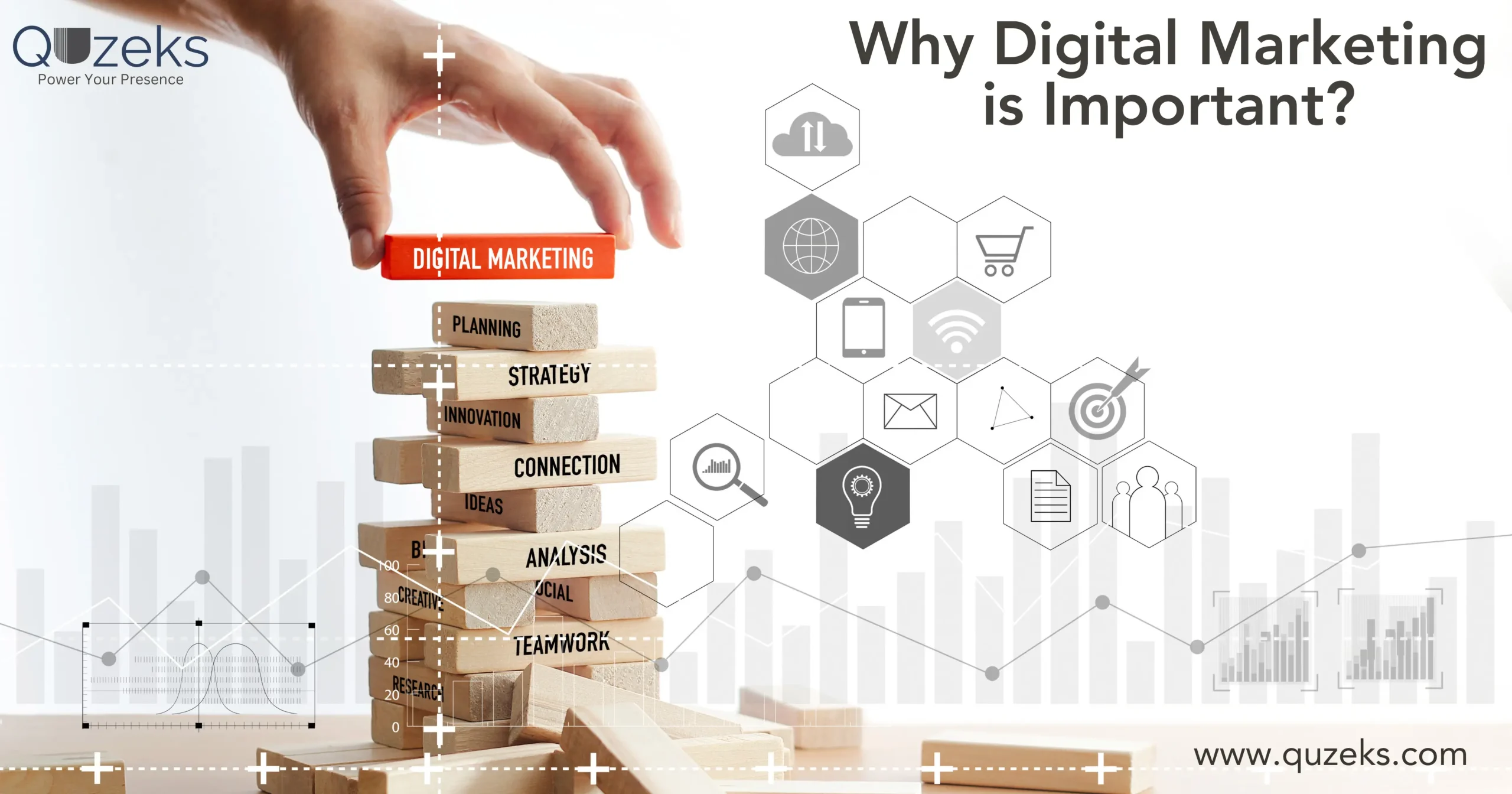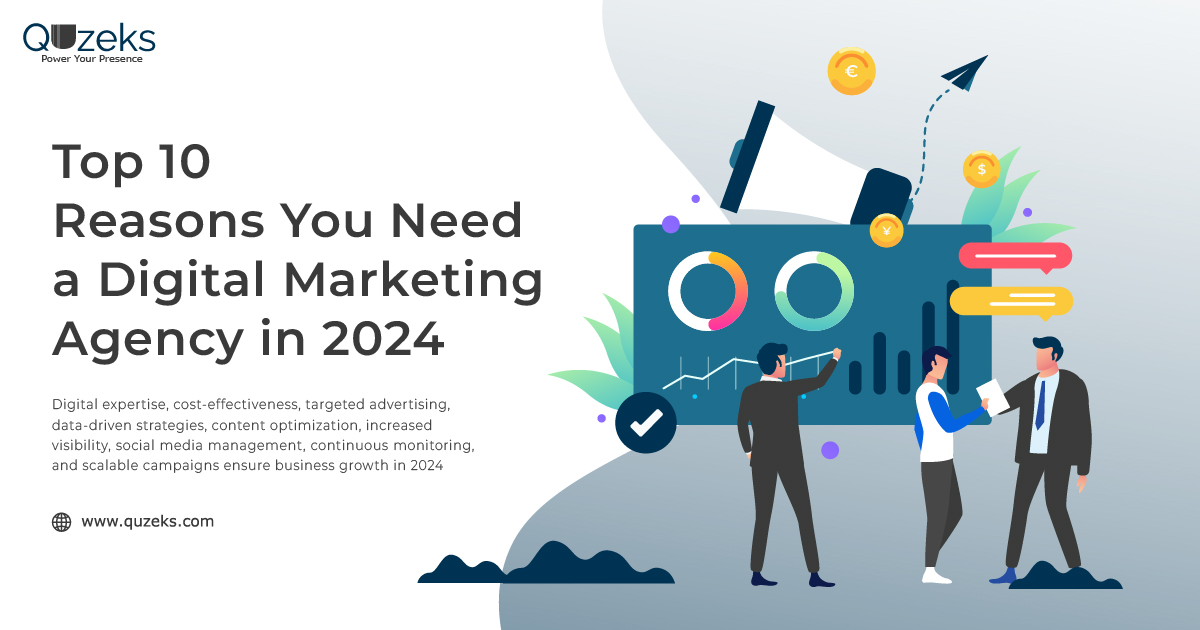- In today’s digital age, businesses are constantly evolving to stay competitive in the market without digital marketing.
- One aspect that has gained immense significance is online marketing.
- From enhancing brand visibility to driving website traffic and generating leads, it plays a crucial role in the success of businesses worldwide.
- In this comprehensive guide, we’ll delve into the technical aspects of why digital marketing is essential and how it can benefit businesses in various industries.
What is Digital Marketing:
- Digital marketing utilizes diverse online platforms to promote products or services.
- These include social media, content marketing, PPC advertising, and SEO.
- For businesses, digital marketing is vital for connecting with both prospective and existing customers, fostering brand awareness, and driving growth.
Importance of Digital Marketing
- It enables brands to effectively target specific audiences, expanding their reach and fostering trust among consumers.
- Unlike traditional marketing, digital strategies allow for precise audience segmentation, making it ideal for reaching niche markets.
- This approach is particularly advantageous for small businesses, as they can leverage digital tactics independently, without the need for extensive marketing resources or external assistance.
- By connecting with customers digitally, brands can build a loyal and engaged audience base, driving growth and success in today’s competitive market landscape.
Here is the best reason of why online marketing is important for your business:
Targeted Audience Identification
- One of the key advantages of digital marketing is its ability to identify and target specific audience segments.
- Through market segmentation and persona development, businesses can tailor their marketing efforts to resonate with the preferences and behaviours of their target audience.
- This increasing the likelihood of conversion.
- Targeted audience identification is the process of figuring out exactly who your ideal customers are.
- Instead of trying to reach everyone, businesses use data and research to identify specific groups of people who are most likely to be interested in their products or services.
Brand Building Strategies
- Online marketing plays a crucial role in building and maintaining a strong brand presence online.
- This involves defining what the brand stands for, communicating its values and personality, and consistently portraying these elements across all marketing channels.
- Through branding efforts such as logo design, storytelling, and customer experiences, businesses aim to build trust and loyalty among their target audience, ultimately enhancing brand recognition and reputation.
Customer Engagement Techniques
- Customer engagement techniques are approaches used to interact and connect with customers in meaningful ways.
- Digital marketing offers various techniques, such as interactive content, email marketing campaigns, and chat boxes for instant customer support, to keep the audience engaged and satisfied.
- By fostering two-way communication and actively involving customers in the brand’s journey, businesses can build stronger relationships.
- This increase customer satisfaction, and encourage loyalty and advocacy.
Data-Driven Decision Making
- Data analytics forms the backbone of digital marketing strategies.
- By collecting and analysing relevant data, businesses can gain insights into customer behaviour, market trends, and performance metrics.
- This enables them to make informed decisions that are based on evidence rather than assumptions.
- Leading to more effective marketing campaigns, better resource allocation, and improved overall business outcomes.
Cost-Effectiveness of Digital Marketing
- Compared to traditional marketing methods, online marketing is more cost-effective, making it accessible to businesses of all sizes.
- With careful planning and optimization, online marketing campaigns can deliver a higher return on investment (ROI) and better results than traditional advertising methods.
- Compared to traditional marketing methods, digital marketing typically requires lower upfront costs and offers greater flexibility in budget allocation.
- Additionally, online marketing campaigns can be optimized in real-time based on performance data, allowing businesses to maximize their marketing dollars and achieve better results for less money.
Global Reach and Accessibility
- One of the most significant advantages of digital marketing is its ability to transcend geographical boundaries.
- Through online channels such as websites, social media, and search engines, businesses can reach a global audience.
- And operate on a 24/7 basis, ensuring accessibility and availability to potential customers across different time zones.
- This accessibility ensures that businesses can operate on a global scale and reach customers wherever they are, expanding their market reach and opportunities for growth.
Adaptability to Market Trends
- It offers greater agility and flexibility compared to traditional marketing methods.
- With real-time data and insights, businesses can quickly adjust their strategies to capitalize on emerging opportunities and stay ahead of the competition.
- Adaptability to market trends involves the ability of businesses to respond quickly and effectively to changes in consumer behaviour, technology, and market conditions.
Enhancing Customer Experience
- Personalization is key to enhancing the customer experience in digital marketing.
- Enhancing customer experience involves improving every interaction and touch point that a customer has with a business.
- This includes providing personalized and seamless experiences across all channels, anticipating and meeting customer needs and preferences, and delivering exceptional service and support.
- By focusing on enhancing the customer journey and making it as smooth and enjoyable as possible.
- Businesses can foster loyalty, satisfaction, and advocacy among their customers.
- Leading to long-term relationships and repeat business.
Building Authority and Credibility
- Building authority and credibility involves establishing trust and expertise in the eyes of customers and stakeholders.
- Through thought leadership, testimonials, consistent delivery of high-quality products or services and case studies.
- Moreover, by demonstrating knowledge, reliability, and integrity, businesses can earn the confidence and respect of their audience.
- This leads to increased credibility, brand loyalty, and market influence.
Competitor Analysis and Benchmarking
- Monitoring competitor’s strategies and benchmarking performance is vital in digital marketing.
- By conducting thorough competitor analysis and SWOT assessments, businesses can identify areas for improvement and differentiate themselves in the market.
- Competitor analysis and benchmarking involve studying and comparing the strategies, performance, and positioning of competitors in the market.
- Benchmarking against competitors enables businesses to set realistic goals and track progress.
- It also keeps them informed about industry trends, ensuring competitiveness and relevance.
Return on Investment (ROI)
- Measuring the ROI of online marketing efforts is crucial for evaluating their effectiveness and optimizing future strategies.
- By employing measurement methods and tracking KPIs, businesses quantify digital marketing impact.
- This enables data-driven decision-making.
- Return on investment (ROI) measures the profitability and effectiveness of marketing efforts by comparing the revenue or profit generated from the investment.
- Online marketing provides tools and metrics to measure ROI.
- Businesses can track campaign performance and calculate value relative to costs.
- Furthermore, by optimizing campaigns based on ROI metrics, businesses can allocate resources more efficiently and achieve higher returns on their marketing investments.
Future Trends in Digital Marketing with Quzeks
- Looking ahead, digital marketing is poised to continue evolving with advancements in technology.
- AI integration, voice search optimization, and augmented reality (AR) experiences are among the future trends that will shape the landscape of digital marketing.
- They offering new opportunities for businesses to connect with their audience in innovative ways.
Conclusion:
- In conclusion, digital marketing is not just a trend but a necessity for businesses looking to thrive in today’s competitive market environment.
- Its ability to target specific audiences and drive engagement makes digital marketing indispensable.
- It delivers measurable results, aiding modern businesses in achieving sustainable growth and success.
- Quzeks is the best digital marketing agency to help grow your business sucessfully.
References:
- Digital Marketing By Wikipedia [1].
Online marketing is important because it allows businesses to reach a vast audience, target specific demographics, track and analyze performance easily, build brand awareness, engage with customers directly, and generate leads and sales more effectively compared to traditional methods.
Digital marketing is the key to success because it offers targeted reach, measurable results, cost-effectiveness, global reach, and the ability to adapt quickly to market changes, enabling businesses to stay competitive and maximize their ROI.
The purposes of digital marketing are to increase brand awareness, drive website traffic, generate leads and sales, engage with customers, build customer loyalty, and measure and analyze marketing efforts for continual improvement.



